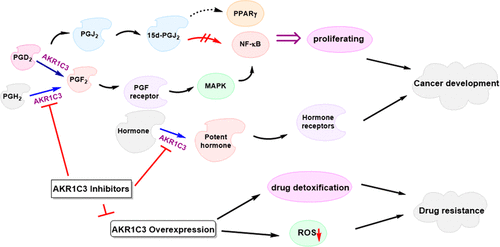当前位置:
X-MOL 学术
›
J. Med. Chem.
›
论文详情
Our official English website, www.x-mol.net, welcomes your
feedback! (Note: you will need to create a separate account there.)
Overview of AKR1C3: Inhibitor Achievements and Disease Insights.
Journal of Medicinal Chemistry ( IF 6.8 ) Pub Date : 2020-05-28 , DOI: 10.1021/acs.jmedchem.9b02138 Yang Liu 1 , Siyu He 2 , Ying Chen 3 , Yijun Liu 1 , Feng Feng 3, 4 , Wenyuan Liu 1 , Qinglong Guo 2 , Li Zhao 2 , Haopeng Sun 1
Journal of Medicinal Chemistry ( IF 6.8 ) Pub Date : 2020-05-28 , DOI: 10.1021/acs.jmedchem.9b02138 Yang Liu 1 , Siyu He 2 , Ying Chen 3 , Yijun Liu 1 , Feng Feng 3, 4 , Wenyuan Liu 1 , Qinglong Guo 2 , Li Zhao 2 , Haopeng Sun 1
Affiliation

|
Human aldo-keto reductase family 1 member C3 (AKR1C3) is known as a hormone activity regulator and prostaglandin F (PGF) synthase that regulates the occupancy of hormone receptors and cell proliferation. Because of the overexpression in metabolic diseases and various hormone-dependent and -independent carcinomas, as well as the emergence of clinical drug resistance, an increasing number of studies have investigated AKR1C3 inhibitors. Here, we briefly review the physiological and pathological function of AKR1C3 and then summarize the recent development of selective AKR1C3 inhibitors. We propose our viewpoints on the current problems associated with AKR1C3 inhibitors with the aim of providing a reference for future drug discovery and potential therapeutic perspectives on novel, potent, selective AKR1C3 inhibitors.
中文翻译:

AKR1C3概述:抑制剂成就和疾病见解。
人醛基酮还原酶家族1成员C3(AKR1C3)被称为激素活性调节剂和前列腺素F(PGF)合酶,可调节激素受体的占用和细胞增殖。由于在代谢性疾病和各种激素依赖性和非依赖性癌中过表达,以及出现了临床耐药性,因此越来越多的研究研究了AKR1C3抑制剂。在这里,我们简要回顾了AKR1C3的生理和病理功能,然后总结了选择性AKR1C3抑制剂的最新发展。我们提出了与AKR1C3抑制剂有关的当前问题的观点,旨在为将来的药物发现和新型,有效,选择性的AKR1C3抑制剂的潜在治疗观点提供参考。
更新日期:2020-05-28
中文翻译:

AKR1C3概述:抑制剂成就和疾病见解。
人醛基酮还原酶家族1成员C3(AKR1C3)被称为激素活性调节剂和前列腺素F(PGF)合酶,可调节激素受体的占用和细胞增殖。由于在代谢性疾病和各种激素依赖性和非依赖性癌中过表达,以及出现了临床耐药性,因此越来越多的研究研究了AKR1C3抑制剂。在这里,我们简要回顾了AKR1C3的生理和病理功能,然后总结了选择性AKR1C3抑制剂的最新发展。我们提出了与AKR1C3抑制剂有关的当前问题的观点,旨在为将来的药物发现和新型,有效,选择性的AKR1C3抑制剂的潜在治疗观点提供参考。


















































 京公网安备 11010802027423号
京公网安备 11010802027423号